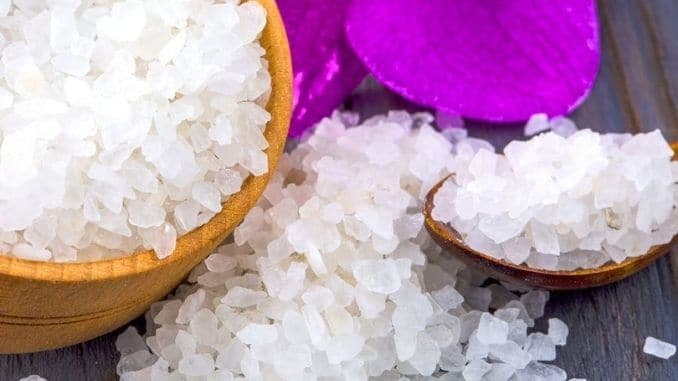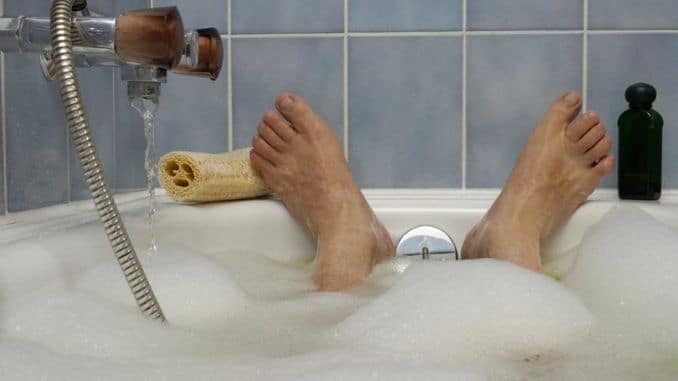
He you ever wondered about Epsom salt, such as why are Epsom salt baths good for us? For centuries, people have used Epsom salt for all sorts of things. Apparently, Epsom salt is a great fertilizer for your garden. Some folks mix it with water and drink it for the laxative effect Epsom salt has on the body. Plus, Epsom salt, mixed with dish soap is said to be an excellent grout cleaner. It seems that Epsom salt is an all-around amazing household staple that has countless practical uses.
What is Epsom salt? First of all, Epsom salt isn’t actually a sodium-based salt at all. Chemically, Epsom salt is known as magnesium sulfate. In 1695, a chemist named Nehemiah Grew discovered it in the waters of a saline spring. Grew named the compound after the nearby rural community of Epsom in Surrey, England (about 14 miles south of London). Boiling down the water of the Epsom springs left behind the medicinal crystalline substance.
Epsom salt baths. Locals had been bathing in the Epsom springs and finding relief for all sorts of ailments. People would come from miles and towns away to experience the benefit of soaking in the springs. Even today, an Epsom salt bath is one of the most beneficial, at-home therapeutic treatments a person can practice. We’ve found that Epsom salt baths are excellent for numerous conditions. Here are some of the ways bathing in Epsom salt can help the body.
Bathing in Epsom salt can relieve muscle cramps. Often, people who have low magnesium levels experience muscle cramps and spasms. Because Epsom salt is a mineral compound, an Epsom salt bath is an excellent remedy for muscle cramps. When you soak in a hot bath with Epsom salt, your body absorbs the beneficial magnesium through the skin — boosting magnesium levels and relaxing the muscles to reduce cramping and spasms.
An Epsom salt soak relieves stress and tension. While it’s true that soaking in any hot bath helps you relieve stress, folks over at the Epsom Salt Council say that you can relieve stress and tension further by soaking in a hot bath with Epsom salt. Furthermore, here’s what they had to say.
Furthermore, “Excess adrenaline and stress are known to drain the body of magnesium, which is the main component of Epsom salt. The body requires magnesium to bind adequate amounts of serotonin, a mood-elevating chemical within the brain that creates a feeling of well-being and relaxation. Restoring magnesium levels also reduces anxiety… .”
Take an Epsom salt bath to detoxify the body. Moreover, because the skin is our largest organ and the one that helps us eliminate the most toxins from our bodies, an Epsom salt bath is an excellent way to detoxify the body.
Furthermore, soaking in an Epsom salt bath stimulates your lymphatic system to encourage optimal blood and oxygen flow to the body. According to Lori Ryman, author at Health Extremist, the sulfates in Epsom salt are essential for stimulating the pancreas to produce the enzymes necessary for detoxification. The Epsom salt bath helps neutralize toxins and protect the body from heavy metals.
Soaking in an Epsom salt bath can regulate your electrolytes. Moreover, magnesium itself is a powerful and necessary electrolyte for the body. Studies have shown that a soak in an Epsom salt bath can help regulate the body’s electrolytes. This process helps to promote optimal nerve, muscle and enzyme functions. Magnesium also helps the body absorb and use calcium that, according to the Epsom Salt Council, is the main conductor for electrical current in the body.
An Epsom salt bath can soften your skin. Not only does soaking in an Epsom salt bath help soften and refresh your skin, including an Epsom salt scrub in your routine increases the skin-softening effects. Prepare the usual hot Epsom salt bath. Then, while you’re in there, take a couple of tablespoons of Epsom salt and mix it into an unscented, natural body wash. Moreover, scrub your skin with the body wash to exfoliate and rinse.
Take an Epsom salt bath to overcome a migraine headache. Moreover, most migraine sufferers have low levels of magnesium. The magnesium absorbed through the skin in an Epsom salt bath can help relieve the pain of a migraine headache. Since the magnesium also induces muscle relaxation, an Epsom salt bath may be the perfect natural remedy for a migraine.
Bathe in Epsom salt to lower your blood pressure. Moreover, to relax the blood vessels in the body, soak in a bath with Epsom salt. Relaxing the blood vessels, in turn, lowers blood pressure. The magnesium in Epsom salt is what induces this relaxation. Research has shown that soaking in an Epsom salt bath for slightly more than 10 minutes raises the body’s magnesium level by a whopping 35 percent.
Relax in an Epsom salt bath before bed for better sleep. According to researchers at Healthline, adequate magnesium levels are essential for sleep and stress management, likely because magnesium helps the brain produce neurotransmitters that induce sleep and reduce stress. The researchers also found that magnesium helps the body produce the sleep hormone melatonin.
Some patients suffering from fibromyalgia use Epsom salt baths for relief. The widespread pain, sensitivities, sleep disruption and anxiety associated with fibromyalgia has been treated successfully by some patients with routine Epsom salt baths. Numerous accounts of pain relief, reduction in swelling and anxiety relief have been recorded among those who suffer from fibromyalgia.
Soak in an Epsom salt bath for psoriasis relief. Moreover, a bath with Epsom salt is an effective remedy for those who struggle with psoriasis. Ashish Agarwal uses Epsom salt soaks to help treat his psoriasis. He says, “When you soak in a bathtub with Epsom salt dissolved in it with other additives such as essential oils and baking soda — inflammation, itching, and irritation related to psoriasis can be reduced significantly. Also, it helps in the easy removal of psoriasis scales by softening them.”
A lukewarm (not hot) bath with Epsom salt can help soothe and heal a sunburn. Moreover, the anti-inflammatory properties of Epsom salt can help soothe tender sunburned skin. The Epsom salt in the bath promotes optimal blood circulation, which speeds up the healing process while relieving the pain associated with sunburn.
Soaking in an Epsom salt bath can help eliminate symptoms of PMS. Moreover, some of the symptoms associated with premenstrual syndrome (PMS) include anxiety, headache, inflammation and mood swings. Bathing with Epsom salt can help alleviate the PMS symptoms. The magnesium absorbed during an Epsom salt bath can help relax the muscles to reduce inflammation, soothe a headache and relieve anxiety. The sulfates in the Epsom salt also help the body absorb certain vital nutrients.
Epsom salt baths may help relieve pain associated with gout. Because of the high mineral content of Epsom salt, it is a common and effective treatment for gout flare-ups. Epsom salt baths can help the body excrete uric acid, the substance that causes pain for gout sufferers by crystallizing in the joints. During gout flare-ups, it’s recommended to soak in an Epsom salt bath for about 20 minutes before bed.
Buying the best Epsom salt. It’s wise to buy Epsom salt in its pure form, rather than salts with oils or fragrances added. If you wish to add anything to your Epsom salt, you can do it at home. You should also look for a “Drug Facts” box and a USP (United States Pharmacopeia) approval somewhere on the label or container. Moreover, the USP certification means the Epsom salt has been approved by the U.S. Food and Drug Administration.
How to make the perfect Epsom salt soaking bath. For healthy adults, the recommended method is to determine a comfortable temperature for your bath and fill up the tub. Then, measure out around two cups of Epsom salt (more for an oversized tub) and pour it into the bathwater. Swish the salt around a bit to dissolve it and hop in. Relax in the tub for at least 10 minutes — 20 minutes is even better.
For children weighing less than 60 pounds, just a half cup of Epsom salt in a bathtub full of water does the trick. Moreover, for older children, weighing between 60 to 100 pounds, one cup of Epsom salt is recommended. Of course, we always recommend speaking with your trusted health care practitioner before you begin the practice if you have any questions or medical conditions.
Optional add-ins for your Epsom salt bath. Epsom salt is great on its own. However, you can add certain oils and other nutrients to your bath for even more benefits. For instance, if you’d like to calm your nerves with a soothing, hot Epsom salt bath, consider adding about 10 drops of a calming essential oil like lavender, chamomile, mandarin or ylang-ylang.
Dr. David Jockers, a functional nutritionist, recommends resting in a bath with two cups of Epsom salt, two cups of sea salt and two cups of baking soda for radiation detoxification after cancer treatments.
If you’re hoping to get a good night’s sleep after an Epsom salt bath, consider adding around 10 drops of bergamot, vetiver or wild orange essential oil to your bathwater.
For itchy or dry skin, add about a tablespoon of olive oil or coconut oil to your hot Epsom salt bath.
Epsom salt is an excellent choice to naturally improve your health. Epsom salt is easy to find at your local drugstore or supermarket. It’s safe, natural and relatively affordable. Bathing with Epsom salt is an effective alternative to over-the-counter pain relievers or prescription medication. Consider a hot bath with Epsom salt for better health.
For your guide to the best foods to heal your body, check out The Best Foods that Rapidly Slim & Heal in 7 Days, here!






